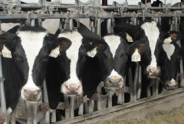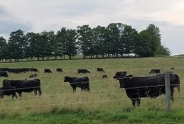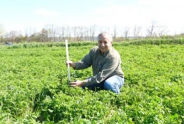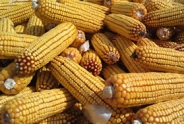Understanding and Mitigating Lameness
Event Details
Date
March 22, 2022
Time
10:00am-12:30pm
Location
Virtual Workshop Via Zoom
Host
South Central New York Dairy & Field CropsBetsy Hicks
607-391-2672
email Betsy Hicks
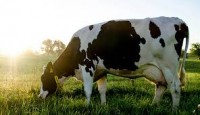
This virtual workshop is for anyone who works with dairy cattle. This program will cover how to identify lameness, what factors cause lameness, and practical strategies to avoid and mitigate lameness on your dairy.
Workshop Topics
10am-10:15am Economic Impact of Lameness: A brief overview of the impact lameness has on farm profitability due to milk loss, delayed conception, and costs related to extra handling, treatment, and early culling.
10:15am-11:00am Risk Factors and Best Management Practice: Improving lameness in your dairy herd needs a multi-faceted approach. Presenters will discuss herd management and facility factors that are known risk factors for lameness and strategies to reduce lameness on your farm.
11:00am-11:15am Foot Baths: A brief discussion on the best practices for implementing and managing footbaths.
11:15am-noon Effective Lameness Detection: Early detection of lameness combined with a routine foot-trimming program is critical to minimize the impact on the farm.
Noon-12:30pm Questions for presenters.
We can offer this program at no cost to participants because of the generous support of our sponsors.
Register Understanding and Mitigating Lameness
After registering, you will receive a confirmation email containing information about joining the webinar and the Zoom link.
Presenters:
Dr. Jan Shearer, DVM, Professor, Iowa State University College of Veterinary Medicine.
Dr. Jan Shearer is the Dairy Extension Veterinarian at Iowa State University College of Veterinary Medicine. Dr. Shearer has several decades of experience in training producers on the best approaches to manage lameness in cattle. He established the Master Hoof Care Program, a training program designed to teach on-farm employees how to properly trim and treat foot problems. Since 1996, this program has acquired international prominence for its impact on foot health in dairy operations.
Lindsay Ferlito, MS, NCRAT Regional Dairy Specialist, Cornell Cooperative Extension.
Lindsay Ferlito has a passion for cow comfort and the dairy industry. For the last 10 years Lindsay has been conducting applied research focusing on cow comfort and facilities, delivering educational programs on cow comfort and lameness, and providing producers with herd specific feedback relative to regional benchmarks. By visiting hundreds of dairies across the country, she has gained a unique perspective and understanding of cow comfort and the dairy industry both in New York and across the United States.
Betsy Hicks, MS, SCNY Regional Dairy Specialist, Cornell Cooperative Extension.
Betsy Hicks considers lameness avoidance to be essential to a profitable dairy farm. She approaches cow comfort and lameness from her dairy cattle nutritionist background. In her role as a Dairy Specialist, she has conducted applied research, developed and implemented educational programs and collaborated on efforts to decrease and effectively prevent lameness in dairy cows.
Margaret Quaassdorff, MS, NWNY Regional Dairy Specialist, Cornell Cooperative Extension.
Margaret Quaassdorff brings her experience as a herd manager and nutritionist to the subject of reducing lameness in dairy cows. Margaret takes a practical approach to implementing lameness avoidance practices on dairy farms. She has collaborated on lameness mitigating educational programs and applied research.
Upcoming Events
Pesticide Applicator Exam Prep Course
February 2, 2026 : Pesticide Applicator Exam Prep Course - Ballston Spa
Ballston Spa, NY
February 5, 2026 : Pesticide Applicator Exam Prep Course - Cobleskill
Cobleskill, NY
CANCELLED
February 6, 2026 : Pesticide Applicator Exam Prep Course - Herkimer
Herkimer, NY
February 9, 2026 : Pesticide Applicator Exam Prep Course - Morrisville
Morrisville, NY
February 13, 2026 : Pesticide Applicator Exam Prep Course - Norwich
Norwich , NY
I Thought I Was Covered for That! - Farm Insurance Webinar Series
January 13, 2026
January 20, 2026
January 27, 2026
February 3, 2026
February 10, 2026
Free Webinar Series
Swine Production Zoom Series
February 5, 2026
February 19, 2026
March 5, 2026
March 19, 2026
April 2, 2026
Register for the whole series or for one or several sessions.
Announcements
Statewide Field Crop Pathology Needs Assessment Survey
Your input is wanted for identifying priorities!Sign Up for Our Weekly E-Newsletter
We send out a bi-weekly e-newsletter that has announcements, upcoming programs, and opportunities for you! Registration is quick, easy, and free. Click here to sign up today!Farmers Can Join MeatSuite For Free!
MeatSuite.com is a free resource provided by Cornell University where NY meat farmers can create a farm profile and list their bulk (wholes, halves, quarters) and bundled (i.e. Grilling Bundle) meat products.Why should farmers join?
1. It's free and easy!
2. Connect with more local customers. In the past year the MeatSuite.com farm directory had 8,300 visits from New York consumers. Farm profiles get as many as 25 views per month from potential local customers. We also spotlight MeatSuite farms on social media and bring attention and purchases to farms through highlights and giveaways.
How do I join?
Farmers can visit https://www.meatsuite.com/farmers/ to create a free farm profile. You must list at least one product for your farm's profile to go live. You'll also have access to Cornell's free Meat Price Calculator, a helpful tool for pricing your meat to make a profit.
While you're on MeatSuite, check out the "Creating Consumer-Friendly Bulk Meats" publication on the log-in page. It has tips on how to create bulk meat products that are easier for first-time buyers to say "yes" to.
If you have any questions as you create your farm profile or products, we're here to help! Please email Matt LeRoux at mnl28@cornell.edu.

